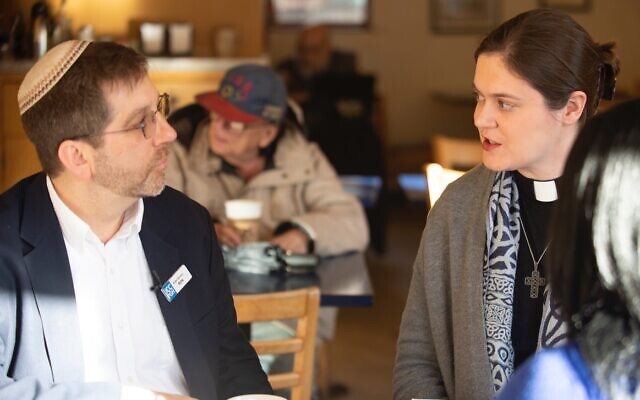Rabbi Ron Symons was headed to the Jewish Community Center of Greater Pittsburgh in Squirrel Hill on the morning of Oct. 27, 2018, when he knew something wasn’t right.
“It was 9:58 in the morning. I made a left turn off of Braddock onto Forbes Extension, and I was driving over the bridge and getting closer to Shady. I was overtaken by police cars,” he recalled. “When I got to a stoplight, I saw them heading toward Tree of Life, and it was striking.”
Symons is the founder of the JCC’s Center for Loving Kindness and its director of Jewish life. When he arrived at the JCC, he pulled into the garage beneath the building, breaking from his habit of parking his car at another nearby garage.
“I knew something was happening,” he said.
Inside the building, Symons found Jason Kunzman, the JCC’s chief program officer, who told him about the shooting at the Tree of Life building. The two immediately put the JCC on lockdown.
The rabbi next tried to contact his wife, Rabbi Barbara Symons, who was conducting services at Temple David in Monroeville and, as a result, was unavailable. He was able to speak with his mother in Buffalo and assured her that he was OK.
“That began one of the longest days of my life,” Symons said.
As he was dealing with the turmoil of the day, there was a knock on the glass doors of the JCC’s Levinson Hall, a rarely used entrance.
“It was Pastor Todd Leach of Shadyside Presbyterian Church, who came just to give me a hug,” Symons said. “That was in the 10 o’clock hour. He was the first person to come in.”
Through the Center for Loving Kindness, Symons has been building and bolstering relationships with clergy of other faiths and other community leaders. One of the first professional phone calls he made that day was to the Rev. Liddy Barlow of Christian Associates of Southwestern Pennsylvania, “just to begin thinking about what do we do, but not even knowing what was.”
All of the senior staff stayed at the JCC, Symons said, because they knew the JCC would be used as the convening spot for the community.
“As we began to set up, people just walked in,” he said. “They were shell shocked. People that weren’t even in the building, people that didn’t have family here but just needed to be somewhere, came here. … I remember family members coming in and embracing me and saying, ‘I don’t know where so-and-so is,’ and not knowing how to respond. It was just so horrific.”
In the hours after the attack, as people gathered, the rabbi said it felt like “a reverse shiva.”
“We knew what happened, we knew who we didn’t hear from, who was in the building, who didn’t come out of the building, and we were just waiting all day long until 6 or 7 o’clock,” he said.
The JCC conference room served as a makeshift control room where the coroner, other county officials and the presidents from the three congregations — Congregation Dor Hadash, New Light Congregation and Tree of Life*Or L’Simcha — were seated around a table while the JCC’s leaders were standing along the back wall.
The coroner said that the plan was to not release the bodies for another 14 hours. Symons said he demanded they start releasing the names.
“I remember the very sad part of watching an FBI agent … tap a family member on the shoulder and bring them in here,” he said. “It was just horrific.”
An interfaith response
That afternoon, Symons, along with Jewish Federation of Greater Pittsburgh Federation scholar Rabbi Danny Schiff, the Rev. John Welch, who was serving as a Pittsburgh police chaplain, and Barlow began planning the following day’s vigil at the Soldiers & Sailors Hall & Memorial Museum in Oakland.
“Because of, not just the work we had been doing on crossing over bridges, but because of generations of work here in Pittsburgh, we were able to put together what happened at Soldiers & Sailors very, very quickly,” Symons said. “It was amazing to see the outpouring of support from the community.”
Asking clergy to speak at the vigil gave Symons a sense of purpose. The ask, he said, was easy because the Jewish community has always been part of the fabric of Pittsburgh.
The decision was made to ask representatives from the three congregations that were attacked to speak, as well as Welch, Barlow and Wasi Mohamed, then-executive director of the Islamic Center of Pittsburgh.
“We knew that Wasi was the strongest interfaith representative from the Muslim community,” Symons said. “Interestingly, he’s not clergy. He’s a spiritual leader, although he would deny it.”
It was important to have interfaith representation so the focus would not be on “those poor Jews,” Symons said, but instead, “woe to us.”
When clergy arrived at the vigil who weren’t originally invited to speak, they were asked to participate in the service, swelling the number to more than 100 people.
The support of the interfaith community, Symons said, continued after the initial reaction to the synagogue shooting. On Nov. 8, clergy gathered in preparation for Thanksgiving. Barlow, Symons said, suggested canceling the event, but the rabbi said, “No, we have to talk.”
That phrase became the moniker of the ongoing effort to bring interfaith spiritual leaders together in Pittsburgh, which now includes more than 500 participants.
The informal Thanksgiving gathering, he said, drew 150 spiritual leaders.
“We prayed; we asked each other questions,” Symons said. “We allowed space for people to talk and brainstorm in an open space: What is that they think we need to do next? We came up with about a dozen subjects and knew not one organization could do it all. People began to grab different aspects.
“The ‘we’ — the Christian Associates of Southwestern Pennsylvania and the Center for Loving Kindness — took on the concept of talking and helping people to understand we need each other and that we belong to each other,” he said.
Chevra Kadisha
In the days immediately following the shooting, Symons said he was walking around “like a zombie,” unsure of how to react. A Jewish ritual provided an answer.
The rabbi is a member of Pittsburgh’s New Community Chevra Kadisha and participated in the tahara, or ritual washing, of the bodies of the victims.
One particular moment came to symbolize both the anxiety and generosity of Pittsburgh’s community, he said.
While at the funeral home Ralph Schugar Chapel and in the process of purifying a body, there was a knock on a door that had the extra security of a folding chair beneath its doorknob.
“It scared me,” Symons recounted. “Under normal circumstances, I would have had the fortitude to open the door myself, but I just couldn’t. I was down. A funeral director, whose name I forget, opened the door by taking away the folding chair, and a little old woman thrust $1,000 in our faces and said, ‘It’s for the married couple’ [Bernice and Sylvan Simon, who were killed in the massacre]. We asked her name, she said, ‘No name.’ We asked if we could give a hug, she said, ‘No hug.’ She just left. We closed the door for security purposes and just embraced each other in tears.”
That act, he said, proved that in incredible darkness there can be sparkles of light.
There is a phrase from the prophets, Symons said, recited each time a tahara is performed. It says Israel’s branches shall spread like an olive tree and its fragrance shall be like Lebanon.
“That day, I was responsible for the reading and wept like a baby,” he said. “Saying that line days after the most antisemitic attack on this land — these are our neighbors — just threw me over the edge. The line has never been innocent for me since. It’s just so painful to go back there.”
Symons continues to serve as the JCC’s director of Jewish life but recently announced that he will step down next year when his wife retires from Temple David. The couple plan to move to New York to be closer to their children.
While Symons said he wouldn’t wish something like the Pittsburgh synagogue shooting on anyone, it did amplify long-held values: Love your neighbor as yourself, do not stand idly by as your neighbor bleeds, and the “redefining of neighbor from a geographic term to a moral concept.”
David Rullo writes for the Pittsburgh Jewish Chronicle, where this story first appeared. This story is part of ongoing coverage of the Pittsburgh synagogue shooting trial by the Pittsburgh Jewish Chronicle and the Pittsburgh Union Progress in a collaboration supported by funding from the Pittsburgh Media Partnership.



